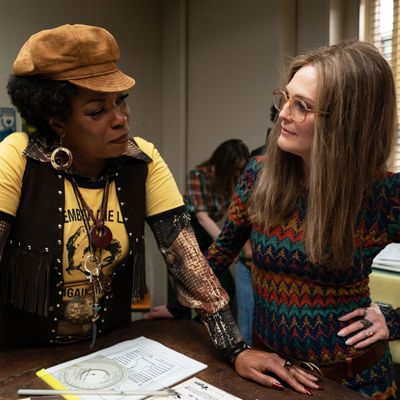
The Glorias is a Gloria Steinem biopic that, like its subject, refuses to go the traditional route. Instead of starting at the beginning of Steinem’s experiences and marching a chronological straight line through them, the film, directed by the always experimental Julie Taymor, leaps forward and backward through different eras of her life, dipping in for significant moments from childhood, adolescence, and various phases of adulthood, including Steinem’s emergence as a feminist activist in the 1970s. It’s a bold cinematic approach that can’t quite overcome the rote nature of a script that, as co-adapted by Taymor and playwright Sarah Ruhl from Steinem’s memoir, My Life on the Road, is trying to cram a lot of biographical detail into a single feature.
The plural nature of the movie’s title refers to the fact that there are four Glorias in The Glorias: the girl (Ryan Kiera Armstrong) who, along with the rest of her family, is beholden to the whims of her eccentric, travel-focused father (Timothy Hutton); the adolescent (Lulu Wilson) who feels responsible for her depressed and anxiety-ridden mother (Enid Graham); the young woman (Alicia Vikander) who travels through India and starts to make a name for herself as a journalist; and the older woman (Julianne Moore) who founds Ms. magazine and finds her voice as America’s most famous advocate for women’s rights.
In a running motif, we see all four of these Glorias riding on a Greyhound bus, en route to a destination that remains unknown until the end of the film, sometimes talking to one another, questioning the choices they (she?) have made or will make. Some scenes begin with one Gloria and turn out to be taking place at a completely different time, with a different Gloria, than initially implied. At one point, Armstrong’s Gloria is in the back seat of a car, crying, while pro-life protesters bang on the windows and shout at her. When the car stops and the back door opens, it’s actually Moore’s Gloria who emerges, ready to give a homily in 1978 at St. Joan of Arc Church in Minneapolis. (Yes, this caused controversy at the time.)
All the toggling between time periods and Steinems is effective at conveying the idea that a woman can only evolve if she moves forward while staying in touch with who she once was. It also gets at one of the subtexts of the film: that women have to constantly play different roles based on their own desires and the often conflicting expectations of society. The problem is that all that movement makes it difficult to ever fully settle into the movie or to feel as though we’re spending time truly getting to know Steinem. Logically, the brain understands that all four of these Glorias are the same person, but emotionally, that connection is harder to make, even though all of the actors do a solid job of inhabiting her. Vikander, especially, captures Steinem’s mannered way of speaking, as well as the warmth she radiates toward other women.
Through no fault of the film’s, which is now available exclusively on Prime Video, it also happens to be arriving not long after Mrs. America, the FX on Hulu limited series about the ’70s feminist movement that covers some of the same territory as The Glorias does. When the movie introduces us to other leaders in the pro-ERA fight, like Flo Kennedy (played in a spirited performance by Lorraine Toussaint) and Bella Abzug (Bette Midler), and then takes us inside the historic 1977 National Women’s Conference, some viewers may feel like they’ve already seen this movie. They also may feel like they got a more nuanced take on at least part of Steinem’s life, as realized by Rose Byrne and only Rose Byrne, from watching that series too.
The Glorias treats Steinem with extreme reverence, which is not a surprise, since she had some involvement in the production. Frankly, reverence is appropriate in this case, though it would have added more layers to the film if Taymor spent more time considering her shortcomings too. The movie certainly humanizes her. We watch as Gloria wrestles with a fear of public speaking, guilt over not visiting her father in the hospital prior to his death, and anger with herself for not standing up more forcefully to male editors, including male editors at this very magazine. But the film never lets you forget that Gloria Steinem is an icon, especially in its concluding twist.
There are some flights of directorial fancy that, like much of the movie, are beautifully shot and interesting to watch but don’t add deeper substance or insight to the overall story. One of those flights starts with an interview with a talk-show host who refers to Steinem as a sex object, then spirals into a series of images of Glorias in different guises — nun, Playboy Bunny, witch — then whips the host through a tornado in a Wizard of Oz–ian flourish. In another blatantly metaphorical sidebar that’s also reminiscent of a Talking Heads music video, Moore’s Steinem walks down a long road as the yellow lines from the pavement wash over her face. Taymor undoubtedly included these moments for a reason, but it’s not immediately apparent what that reason is.
A movie about such a pivotal figure who fought, and still fights, so hard for gender equality should spark some intense emotion, especially if you’re a woman. Weirdly, The Glorias never does that. With a runtime of two and a half hours, it lasts too long and doesn’t go deeply enough to register the way it should. At one point on that bus ride, Little Girl Gloria asks the other Glorias, “Are we there yet?” Girl, that I felt.
More Movie Reviews
- The Thriller Drop Is a Perfect Addition to the Bad-First-Date Canon
- The Accountant 2 Can Not Be Taken Seriously
- Another Simple Favor Is So Fun, Until It Gets So Dumb


